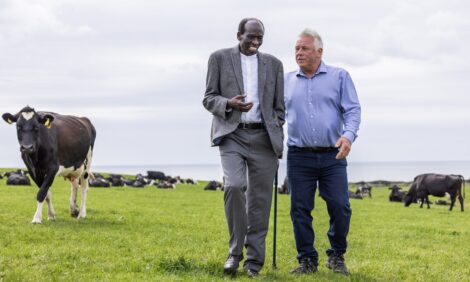



Cattle Rustling a Serious Problem in Northern Ireland
NORTHERN IRELAND, UK - Cattle theft in Northern Ireland has become increasingly problematic in recent years, however tackling it remains a difficult issue. Melanie Jenkins reports.Rural theft is a serious problem in Northern Ireland (NI), with thousands of animals stolen over the past few years alone and very few actually being recovered. Since 2013, farmers have reported 9,745 cattle as lost or stolen to the Department of Agriculture and Rural Development (Dard).
Only 219 of those animals have been recovered. One of the most recent thefts saw £40,000 worth of pedigree stock stolen from a farm in County Antrim.
Although NI is being hit particularly hard, thefts are happening on both sides of the border, with one farmer from County Westmeath, in the Republic of Ireland, losing 75 cattle and 25 sheep to rustling earlier this year, with an estimated value of £72,000. Two men have since been arrested in connection with the theft.
According to Barclay Bell, deputy president of the Ulster Farmer’s Union (UFU), the problem is particularly rife along the border counties, such as Tyrone, Armagh and Fermanagh, as thieves can slip away over the border to avoid notice and exploit the different police services and government bodies.
The Police Service of Northern Ireland (PSNI) is working closely with Dard to address this issue, with the Rural Crime Unit run by representatives from Dard, NFU Mutual, PSNI and representatives from the police service of Ireland, Gardai.
In general, rural theft is falling, according to Superintendent Brian Kee, service head for rural crime at the PSNI. “The police are taking a more proactive role in rural theft and we have been very successful in reducing the theft of machinery due to a tracker scheme. But one crime is one too many.”
Unfortunately, cattle rustling is not always taken as seriously as it should be, conjuring up a sense of the Wild West rather than serious crime.
“But the people responsible are criminals and thieves and need to be treated as such, as the thefts have a significant impact on farmers and the wider community,” said Supt Kee. “Very often a farmer will have raised the cattle from birth and then to have them stolen - this can be a very personal loss as well as financial.”
According to Mr Bell there have been no convictions yet, as it is very hard to know who is behind the thefts.
“We believe it is organised crime, co-ordinated by a group of individuals who know what they are doing and what they are looking for,” he said. ” The thieves are very familiar with how to handle and manage cattle, and have been noted to choose cattle that are prime and ready for market.
Prevention is difficult, but measures can be taken
Unfortunately, locking gates is not a deterrent to organised crime, added Mr Bell. “Of all types of rural theft, livestock rustling is the most difficult to prevent as you cannot have surveillance on every field.”
Improving security around buildings is advisable though, as thieves have been known to target cattle in sheds as well as in fields. Options include installing surveillance cameras and making sure sheds are securely locked.
Any form of locks, CCTV and alarms can act as deterring measures, including signs that alert potential thieves to the presence of security cameras, said Supt Kee. Farmers should also try to check their cattle each day.
“I know cattle can sometimes be kept some distance away from the main farm, but checking them daily means that farmers can be on the lookout for suspicious vehicles and behaviour and report anything to the police. We have suspicions that some thieves have been feeding cattle in advance of a theft, so any sign of this should be reported,” he added.
The PSNI make up a large proportion of the Rural Crime Unit and also have in place a 24-hour telephone number run by Dard, that police officers can contact to confirm whether cattle movements are authentic or not. “If a police officer stopped a lorry in the middle of the night, they could use the number to check whether the ear tags match up with the paper work,” said Supt Kee.
Increasing the police presence has become difficult amidst cutbacks but Mr Bell reckons there are steps that can be taken to help improve police knowledge and experience. “Returning to the old style of policing with local police officers who have direct contact with farmers, so they are aware of what is happening, would help,” he said.
“It is not just the serious financial impact that these thefts have on farmers, but also the mental strain it causes, on top of the other pressures in the industry at the present time and alongside all the other rural thefts,” added Mr Bell.
“Unfortunately the trend looks set to continue, but a first conviction would be a start to ending it. The UFU have had discussions with the police and the next step is to get more training on farm so police officers know what they are looking for and to understand the paperwork and ear tag identification.”
Supt Kee says freeze branding of cattle would improve traceability and discourage theft. This involves branding the cattle with the last three digits of the ear tag number.
“It is a widespread practice in the dairy industry but less so in beef - and we do see less dairy cattle stolen than beef,” he said.
Micro-chipping is another technique which is likely to be implemented in the future, although it is not yet advanced enough, said Mr Bell. However, micro-chipping raises concerns with the Food Standards Agency due to fears that micro-chips could end up in the food chain.
Several other measures are under constant review, including Smart Water – a UV traceable liquid mark - and DNA identification. “There is an opportunity in the market for someone to develop something to help bring these thefts to an end.”
There have been several cases recently where thieves have been caught, said Supt Kee. With more prosecutions and police focusing more on rural theft, it should prevent potential thieves from committing further crimes.
“It is likely that stolen animals either end up at abattoirs or moved onto other farms and given new tags,” he said.
“Some investigations have pointed towards illegal abattoirs. For consumers, if it looks too good to be true, then it probably is,” he added.
“This meat is not something you want to be buying. Any suspicions about the source of meat should be reported immediately as this information could be vital to police investigations and to tackling this illegal activity.”
TheCattleSite News Desk


